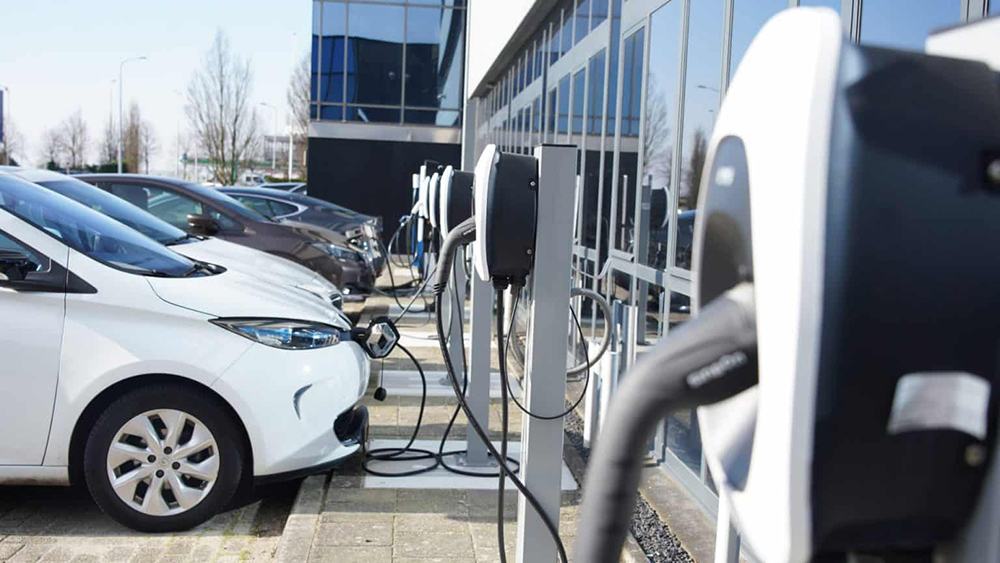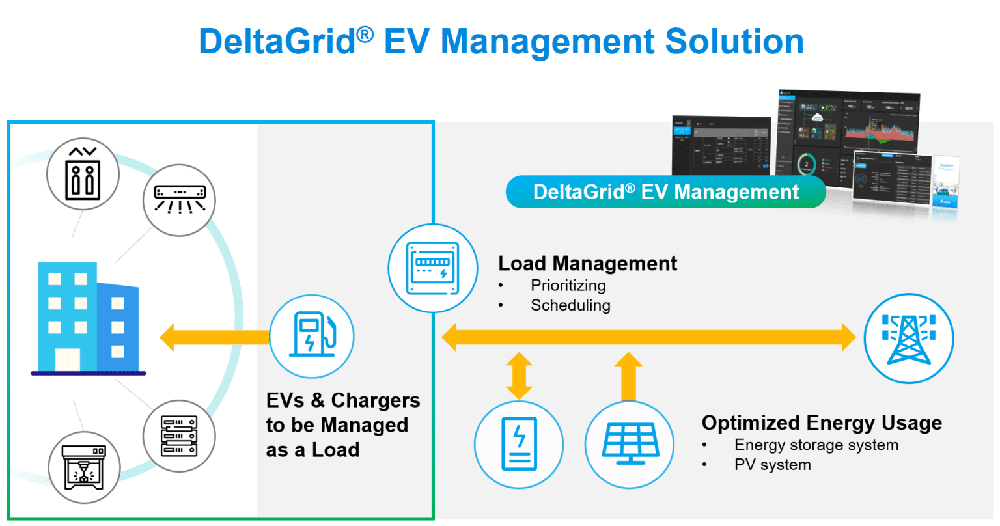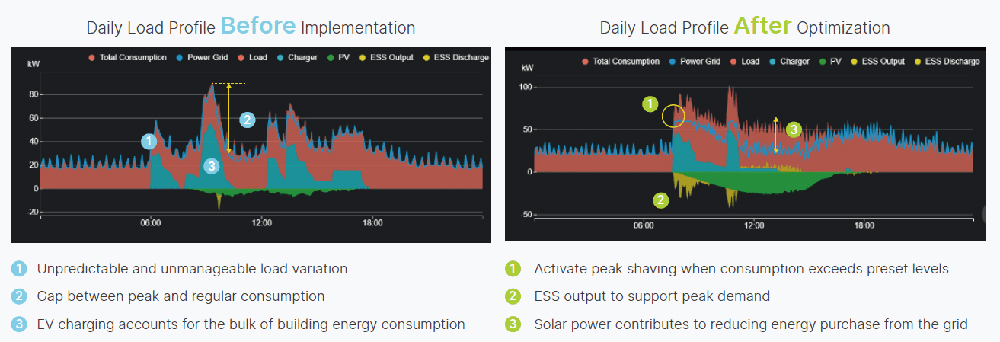Product Search

As Net Zero and low-carbon transportation become key points for governments and enterprises responding to climate action, EVs have become increasingly common, with enterprises now installing chargers to meet the EV-charging needs of their employees and visitors. However, older buildings are typically limited by their existing wiring and power configurations, making it difficult for them to implement substantial changes. For enterprises seeking to embrace the green competition, the difficulties they face include determining how to incorporate new charging demands without triggering circuit breaker trips or creating safety issues, how to leverage electricity cost reductions from energy storage and PV systems, and how to implement appropriate measures to handle power utility plans.
Delta’s Europe headquarters in Hoofddorp, the Netherlands, is located in a building that is over 30 years old. When the building was first constructed, demand for EV charging was simply not a consideration. Its power configuration was thus limited, making substantial reconstruction difficult. However, in October 2021, Delta was able to install 16 chargers in the building’s parking lot by leveraging rooftop PV and energy storage systems. Since their activation, there have been zero power overload incidents, and the building’s total energy cost has been reduced by 15.64%. The key to this success lies in the implementation of DeltaGrid® EVM, a EV charging management system that leverages software and AI in energy deployment to consolidate smart charging. It is one of the few charging management systems on the market to integrate chargers, PV, energy storage, and load management in a single platform.
New demands emerge for old buildings incorporating EV chargers in response to low-carbon transportation initiatives
According to a European Union survey on EV charging behaviors, there are 90% of EV owners charge their vehicle either at home in the evening after work or via EV chargers at their workplace in the morning. At Delta’s Europe headquarters, half of all employees worked from home in 2021 due to COVID-19 mandates. Despite only four to six EVs being charged in the parking lot during peak hours in the morning, electricity consumption from EV charging still exceeded 70% of the total office electricity use. This resulted in Delta having to enlarge the electricity connection in order to maintain the power supply and avoid penalty, and thus increase the fixed capacity tariff every month.
This case clearly demonstrates that with existing electricity infrastructure, diversifying and managing charging peak hours to achieve smart charging will be key to developing effective building and energy management systems in the EV era. Storing energy to dispatch electricity and integrating solar power to consolidate peak shaving will thus be critical to assisting older buildings with more efficiently utilizing existing electricity infrastructure.
After Delta’s Europe headquarters analyzed the curve of its historic electricity use and predicted the EV charging demand, the company decided upon a series of actions. First, they installed 16 AC and DC chargers that can simultaneously charge 24 EVs. To help cope with the anticipated electricity demand, a 50 kW rooftop PV system was set up to generate approximately 42,300 kWh of green electricity each year. An energy storage system with 100 kW output power was also established to store up 293 kWh of electricity, with DeltaGrid® EVM implemented as the core charging management system to regulate EV charging and solar power generation and energy storage.

Leveraging load management and energy regulation to realize smart charging
In contrast to conventional charging management systems that focus on equipment monitoring, DeltaGrid® EV Management is a unified system that manages and controls chargers, electrical load, solar power generation, and energy storage. Thus, it achieves multiple goals for enterprises—uncompromised charging services, optimized power dispatching, and optimized electricity fee structuring, all while conserving energy and reducing carbon emissions. How to achieve effective management and control with DeltaGrid® EVM is detailed in three stages below:
1. Charger management: Consider EV and chargers as high energy-consumption devices and include them in the building’s overall load management.
2. Load management: Optimize charging priorities by grouping demand and scheduling while conducting power usage management by zone and by time. For example, short-stay visitors or VIPs should have their EVs prioritized for charging. The EVs of employees who park for a long time will then be charged in sequence. This spreads out the electricity demand and prevents overloads during peak hours, thus ensuring that contracted power usage levels are not exceeded, which avoids related fines from utility companies. Also, maximum power current limitation feature helps control the highest total output current of each zone, thus preventing spikes that could cause circuit breakers to trip while also eliminating the risk of fire hazards.
3. Integrate energy storage and PV systems: Incorporating solar power can reduce the need to purchase electricity from gird. With energy storage, the system can achieve peak shaving by storing cheap electricity during off-peak hours and excess solar power for use during peak hours. This reduces electricity expenses and more effectively adopts renewable energy.

AI-based automated regulation that continuously increases energy usage efficiency
DeltaGrid® EVM also integrates AI machine learning algorithms that analyze daily electricity usage information to derive the optimal long-term energy dispatch mode.
In the early morning of the working day, the system refers to historic electricity use, solar power generation levels, holiday scenarios, and weather data to calculate the amount of electricity required from the electricity storage system tomorrow. From this, it can determine the most suitable off-peak period for charging. When employees arrive at work, this creates demand for EV charging. Here, the system prioritizes using solar power to cover the sudden increase in demand. If at that moment, the building’s total electricity use exceeds the set threshold of 50 kW, then the energy storage system is activated to achieve peak shaving. However, if there is no substantial charging demand, solar power is used to reduce electricity consumption from the grid. Any surplus electricity from solar power is stored in the energy storage system for later use. On sunny days during holiday periods, solar power and the energy storage system alone can completely cover basic electricity usage for the building, thus achieving self-sufficiency and requiring zero purchased electricity.
Through this cycle, Delta’s Europe headquarters effectively reduced the amount of purchased electricity by 15.64%, and also alleviates the peak load impact caused by EV charging, thereby reducing the related electricity bills. While energy prices in Europe are rising steadily, properly energy controlled, regulated, and scheduled can reduce electricity costs, transmission service fees and energy taxes at the same time. Once the system has been in operation for a longer period, the accumulated data is expected to bring the optimization from AI dispatching into full effect.

With current trends aimed at reducing carbon emissions, the demand for charging management systems will become more prominent and pressing. As a world leader in energy management systems, Delta announced that it had joined the EV100 initiative in 2018, with the aim of achieving 100% electric transport before 2030. Delta has thus been implementing EV-friendly infrastructure in its offices around the world. Through its solar-storage-charging infrastructure, Delta is actively improving the energy usage efficiency of EV charging infrastructure.
DeltaGrid® EVM has now been incorporated into over 100 communities, factories, and offices in Taiwan alone. In the future, Delta will continue to assist commercial offices, factories, and old buildings with limited power configurations worldwide, helping them painlessly transition to an EV-friendly environment to bring about an era of low-carbon power grids and e-mobility.
More solution information? https://deltathailand.com/en/products/Infrastructure/Energy/EV-Charging/Charging-Management-System/DeltaGrid